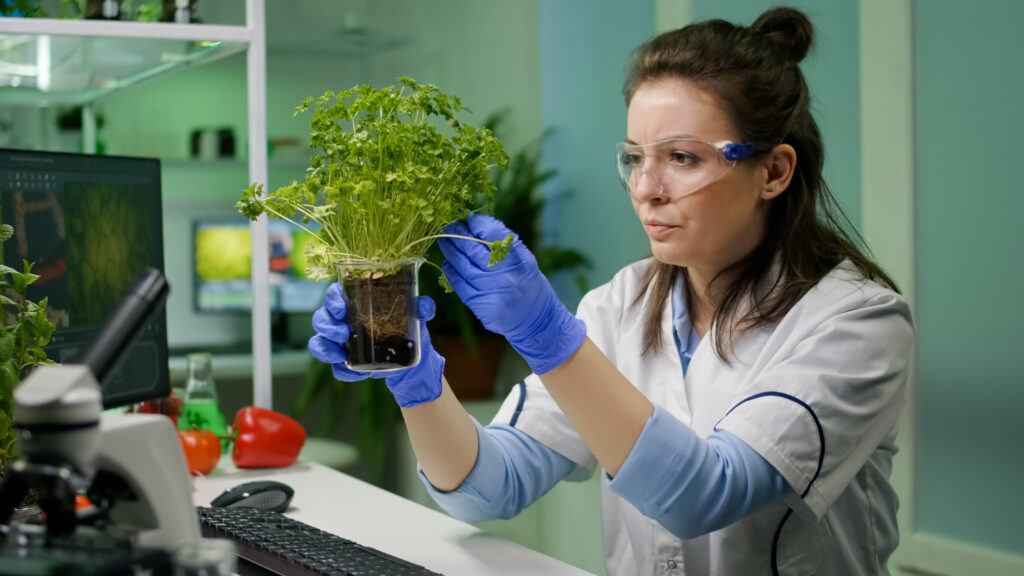Why study biotechnology: a career with broad professional prospects

La biotecnología combina ciencia e innovación para enfrentar desafíos globales como la salud, la alimentación y la sostenibilidad.
Biotechnology is a scientific discipline that has revolutionized the way we address global challenges such as health, agriculture, energy, and the environment.
It combines biology, genetic engineering, and other scientific fields to develop innovative processes that improve human life and protect our planet.
If you are considering studying biotechnology, it is important to understand its multiple applications and the opportunity it offers to develop solutions to challenges that affect all of humanity.
Biotechnology is a multidisciplinary science that integrates diverse areas of knowledge, including molecular biology, genetics, biochemistry, and chemical engineering.
Thanks to advances in genetic engineering techniques, biotechnologists can modify living organisms to obtain beneficial products or services, such as medicines, improved agricultural crops, or new sources of renewable energy.
Biotechnology covers a wide range of sectors, from the pharmaceutical industry, where innovative treatments are developed, to the environmental sector, where technologies are implemented for bioremediation and waste treatment.
In agriculture, biotechnological techniques are used to enhance crop productivity and resistance to pests and diseases.
These advances allow biotechnology to have a direct impact on key sectors of the global economy, improving the quality of life for millions of people.
Studying biotechnology not only offers the chance to participate in cutting-edge research but also to contribute to technological solutions that transform entire industries.
With a degree in biotechnology, you will be able to design, research, and apply biotechnological processes that impact areas as diverse as human health, agriculture, the food industry, and environmental management.
Professional opportunities in biotechnology
One of the main reasons to study biotechnology is the wide range of professional opportunities it offers.
As a biotechnology graduate, you will be able to join multidisciplinary teams dedicated to the research, development, and commercialization of innovative products.
Career paths for biotechnology graduates are diverse and include scientific research, the pharmaceutical industry, environmental consulting, and industrial process management.
Graduates can work in research laboratories at universities, government research centers, or private companies, performing roles as researchers or developers of new biotechnological products.
Biotech companies are constantly seeking professionals to design processes that improve food production, develop vaccines, optimize renewable energy production, and create new treatments for diseases.
Another important area of work for biotechnologists is the agri-food sector, where biotechnological techniques are applied to improve product quality, develop more resilient crops, and increase the efficiency of agricultural production.
Biotechnology consulting is also on the rise, as companies require specialized advice on implementing sustainable technologies, complying with safety and environmental regulations, and optimizing biotechnological processes.
Social and environmental impact of biotechnology
The impact of biotechnology goes beyond science and technology; it also has important social and environmental implications.
Thanks to environmental biotechnology, it is possible to use living organisms to clean up pollutants such as oil and heavy metals through bioremediation processes.
It is also possible to develop new sources of renewable energy, such as biofuels, which help reduce dependence on fossil fuels and mitigate climate change.
In health care, biotechnology has enabled the development of innovative treatments such as gene therapy, which aims to cure genetic diseases by introducing or modifying defective genes in patients’ cells.
Biotechnology has also made significant progress in creating vaccines, such as those used to combat infectious diseases, and in producing insulin to treat diabetes.
The genetic improvement of plants and animals also has a major impact on food security by enabling the development of more nutritious crops that are resistant to disease, resulting in greater global food availability.
These advances contribute directly to reducing poverty and improving public health.
In short, studying biotechnology not only allows you to work in one of the most innovative areas of science but also enables you to contribute to global well-being through sustainable and innovative solutions.
From the production of medicines to the improvement of agriculture and environmental protection, biotechnology has the potential to transform our daily lives and the world around us.
If you are passionate about science and want to be part of a field that develops solutions to humanity’s most urgent challenges, studying biotechnology is an educational path that will open doors across multiple industries and give you the chance to make a meaningful difference in the world.








